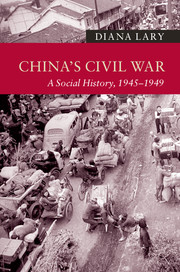Book contents
- Frontmatter
- Dedication
- Contents
- List of figures
- List of tables
- List of maps
- Acknowledgements
- Introduction
- 1 The social background to the Civil War
- 2 Ending one war, beginning another: August 1945–June 1946
- 3 Turning points: July 1946–June 1947
- 4 All-out war: July 1947–June 1948
- 5 Nearing the end: July 1948–January 1949
- 6 The end game: February–December 1949
- 7 Immediate outcomes: the early 1950s
- 8 Social outcomes of the Civil War
- Conclusion
- Glossary
- Index
4 - All-out war: July 1947–June 1948
Published online by Cambridge University Press: 05 March 2015
- Frontmatter
- Dedication
- Contents
- List of figures
- List of tables
- List of maps
- Acknowledgements
- Introduction
- 1 The social background to the Civil War
- 2 Ending one war, beginning another: August 1945–June 1946
- 3 Turning points: July 1946–June 1947
- 4 All-out war: July 1947–June 1948
- 5 Nearing the end: July 1948–January 1949
- 6 The end game: February–December 1949
- 7 Immediate outcomes: the early 1950s
- 8 Social outcomes of the Civil War
- Conclusion
- Glossary
- Index
Summary
In the summer of 1947, the fighting between GMD and CCP forces in Manchuria escalated. The PLA went from the defensive to the offensive, the GMD armies in the opposite direction. It was still not clear, however, that the GMD would lose the Civil War. The government was still strong, still clearly in control of most of China. Its armies still outnumbered the CCP's.
The GMD government still had major plans for the revival of China. The modernisation project, interrupted for eight years by the Resistance War, was revived. This included plans to modernise the economy, and to revamp the political system. The National Assembly, held at the end of 1947, was a huge exercise, in part a publicity effort to show a modernising China. It adopted a new constitution, on 25 December. There was some symbolism to the date. On the same day Chiang Kai-shek made a radio broadcast in Shanghai (perhaps on the model of the King's Christmas Day broadcast in Britain). His tone was plaintive:
In China during the last few years, we have known to the dregs of the bitter cup the meaning of national sorrow. We have suffered inestimable losses due to war and internal rebellion. We have known misrepresentation and cruel slander in its blackest form. Our motives have been misrepresented. Our faults have been distorted beyond all semblance of reality.
He looked for some help to Christianity, to its ability to provide faith for the future, its trust in human character, and in its improvability. But another pronouncement, also made on 25 December, presented a quite different state of mind, totally certain, reliant on a very different belief system.
- Type
- Chapter
- Information
- China's Civil WarA Social History, 1945–1949, pp. 109 - 137Publisher: Cambridge University PressPrint publication year: 2015



